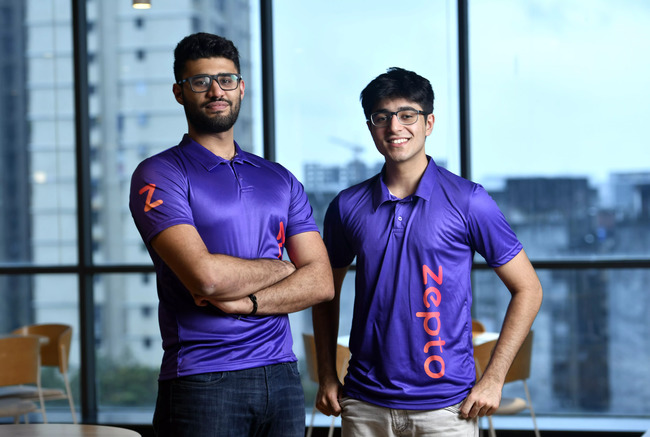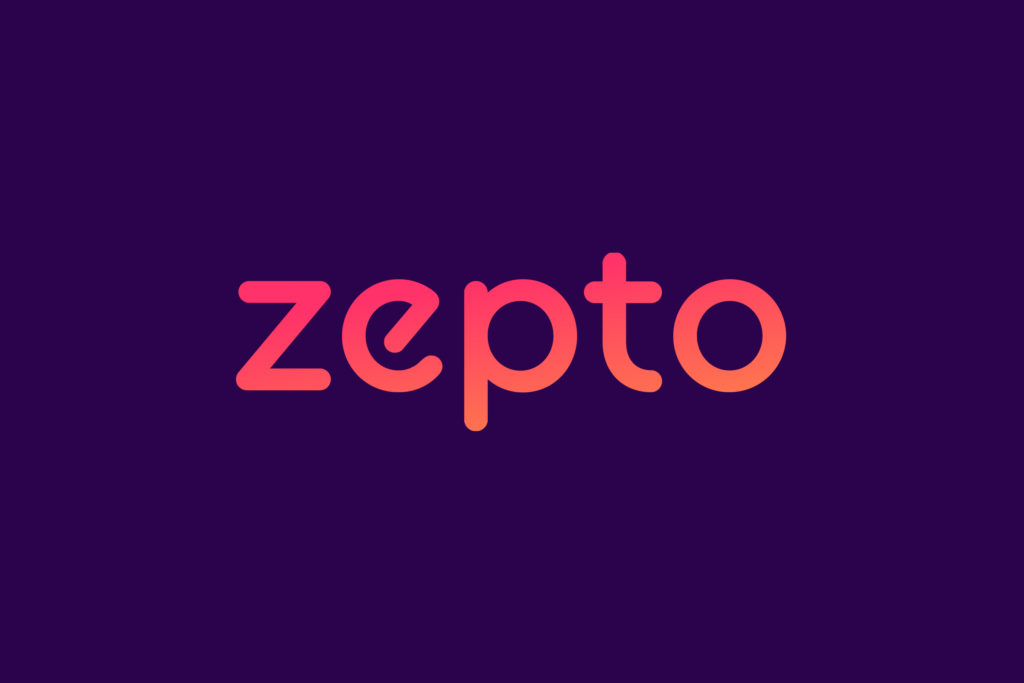
Zepto, which has been operating in stealth mode for the past six months, has announced a $60 million early-stage financing to extend 10-minute grocery delivery across the country. Aadit Palicha and Kaivalya Vohra, both 19, left Stanford University to create Zepto, which has received funding from institutional investors such as Glade Brook Capital, Nexus, and Y Combinator, as well as private investors such as Lachy Groom, Neeraj Arora, Manik Gupta, and others.
The startup, with the meaning of the word ‘zepto’ as “a factor of 10⁻²¹, i.e. 0.000000000000000000001”, provides a 10-minute grocery delivery service, outpacing several highly supported competitors in terms of speed.

How is Zepto different?
Through a network of dark stores and micro warehouses, Zepto offers groceries delivery in 10 minutes (on up to 90% of orders).
Aadit claims that their median delivery time is 8 minutes and 47 seconds, in order to give a smooth delivery experience.
The Mumbai-based firm uses a hub-and-spoke approach to cater primarily to online shopping through a network of dark shops or retail distribution centers.
Dark Store Model
A dark store is a store that isn’t open to the public for in-store shopping. Dark stores, like ghost kitchens, were created to fulfill only online purchases.
Dark stores are frequently located in the suburbs or on the outskirts of cities, where they may take advantage of low-cost real estate and easy access to highways. A typical dark shop in the United States is around 40,000 square feet, so finding affordable real estate is critical.
Dark supermarkets are another name for dark stores. Some dark stores are known as dotcom centers or micro fulfillment centers in the United Kingdom, where they initially arose, especially when they provide click-and-collect services.
A combination of technical and operational excellence allows Zepto to consistently deliver within 10 minutes thanks to its optimized network of ‘cloud stores’ or micro-warehouses.
Palicha explained that the dark stores the startup has set up are designed and optimized for fast delivery. Location intelligence and geospatial data, including geography, demography, road patterns, traffic dynamics, weather, last-mile supply availability, and real estate prices, are used by Zepto to optimize its network.
Furthermore, the startup’s dark stores and cold rooms are built specifically to meet requirements such as ease of navigation, allowing packers to move as quickly as possible to package an order.
Future for Zepto
The startup will launch in Hyderabad, Chennai, Pune, and Kolkata, as well as Mumbai, Bengaluru, and Delhi-NCR within the next 30 days. In addition to its rapid expansion, the company has built out a robust workforce, with a Tech Office in Bengaluru and an Operations HQ in Mumbai. Many well-known Indian businesses sit on its board of directors, including Flipkart, Uber, Dream11, Pharmeasy, and Pepperfry, to name a few.

Palicha says, “Q-Commerce in India is an opportunity of epic proportions and strong unit economics. We’ve been ignoring the noise and executing heads-down for a long time to perfect this model, and our efforts are paying off. Today, we’re consistently growing 200% every single month with an unstoppable team, robust product infrastructure, and deep access to institutional capital.”
Swiggy Instamart, which offers delivery in 15-30 minutes, and Grofers, which wants to begin 10-minute grocery deliveries in ten cities, are Zepto’s main competitors. Along with Dunzo which delivers groceries through their Xpress Mart dark store in 19 minutes.
Currently, the startup is aiming for 100 dark stores across India by early 2022.
With raising an early-stage round of $60million, the online grocery delivery startup values between $200-$300 million.
Zepto plans to spend a major portion of the funds to open more cloud stores, expand its market share and penetrate deeper into the market.
Sanford C. Bernstein stated -“Online grocery penetration is expected to reach ~3%-5% by 2025 from less than 1% today. Long-term structural drivers remain strong: rising income and affluence, lower-tier consumption, e-commerce penetration (~30% CAGR), and a young population (~50% below 25).
Delivering groceries faster than ever before
In the grocery delivery game, companies are marching their way towards decreasing the delivery time. Companies from all around the world like Weezy, Jokr, Gorillas, Grofers, Swiggy Instamart, etc. are competing with a sole objective to cut down the delivery time and deliver groceries within 10-15 minutes.
Zepto with the help of the dark store concept has reduced the grocery delivery to just 10 minutes. It is stated that quick commerce is the next big thing the grocery delivery industry is looking forward to tapping into. Startups like Zepto in India, Fridge No More in the US (NYC) are really among the young leaders in the faster delivery industry.

With these micro fulfillment centers, companies are capitalizing on the no-fridge concept by delivering groceries within minutes. Companies are building their USPs with lightning-fast deliveries which further helps them to unlock potential for greater profit margins.
Many grocery businesses have reestablished themselves despite the devastation caused by the pandemic by focusing more on delivery and utilizing technology. SMEs and startups have stepped up and tapped the opportunities for innovation and growth.
Final words
Quick commerce is expected to grow to $500 million by the end of this year, and then to $5billion by 2025, according to RedSeer’s research. There is a huge potential in the Q-commerce market for India as a market size of nearly $50 billion is estimated in 2021, reaching over 20 million households.
Zepto believes it will be a long-term winner in the Indian Q-commerce market with a bulletproof focus, fast-paced execution, and solid team-building. They also claim to be able to outperform competitors with multiple business models.
Also read: How to build a 15-minute grocery delivery service
Subscribe to stay ahead with the latest updates and entrepreneurial insights!

Subscribe to our newsletter
Get access to the latest industry & product insights.




























